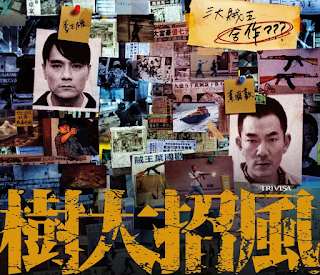The film “Trivisa” is a movie that was
released in 2016, is a film which is filmed by three different directors
separately; who are Frank Hui, Jevons Au and Vicky Wong. They
have filmed three different stories, and are
later edited and combined into one movie, adding a bit more uniqueness to the
movie. “Trivisa” is distinguished as a gangster film, which many people will think the
content will be full of gunfire and fighting scenes, including me. But it turns
out to be more literate, action scenes only account for a minority, the film
focus more on the description on the characters, and the plight they are
facing. The movie carries a deeper meaning presents to the audience.
The film is about the story of three real-life
mobsters in Hong Kong who are Kwai Ping-hung, Yip Kai Foon and Cheung
Tze-keung. They were being called the kings during their heyday. The
film does not take a long time to mention about their remarkable crimes,
instead, it just slightly use a few scenes to let the audience have a clear
concept of what serious crimes had the three mobsters done, and their
personality. What it focuses on is the follow up stories after they have
committed serious crimes. In the movie, Yip Kwok-foon has become a businessman
right away as he realize robbery cannot be a long-term source of money, he
figures out that smuggling electronics are able to earn a huge profit,
therefore he starts his company and join the industry. However, in order to let
things go well, Yip has to bribe the high Chinese officials, and has to flatter
them. This reflects the critical corruption between the merchant and the officials
in China.
Moreover, the film place the setting in 1997,
right before the transfer of sovereignty of Hong Kong, therefore the costumes,
the props and the inner decorations of the houses are set to match the 1990s, which
may arouse people’s collective memories. Collective memory is what people who
live in the same area have in mind together, “It is in society that people
normally acquire their memories. It is also in society that they recall,
recognize, and localize their memories” (Halbwachs 1992, p. 38). The film may remind
the audience some of the memories that they might already forgotten, such as
the mobile phones, the cassette tape, the computers; all are turned into the
old form, reflecting how the era has changed so rapidly.
In the movie, realizing the transfer of
sovereignty of Hong Kong is coming closer, Cheuk
Tze-keung the kidnapper wants to cooperate with the other two mobsters to
plan a final hit, before Hong Kong is returning to her motherland. The other
two agree to participate, but unfortunately (or fortunately), they end up
failing to achieve the goal because all of them are being caught by the police
and public security at the end. They all have suffered a dismal ending. The film
uses this as a metaphor, reflecting the development of Hong Kong after the
reunification is over the hill, no matter how well it has done before; Hong
Kong can rarely returns to her best condition under the control of China. And also
the Hong Kong citizens feel discouraged when it comes across with the nomocracy and democracy being challenged.
Miss those good old days.
Reference:
Sills, D. L. (1968). International encyclopedia of the social sciences. Available
from https://sociology.virginia.edu/sites/sociology.virginia.edu/files/galecm.pdf
[31 March, 2017]





















